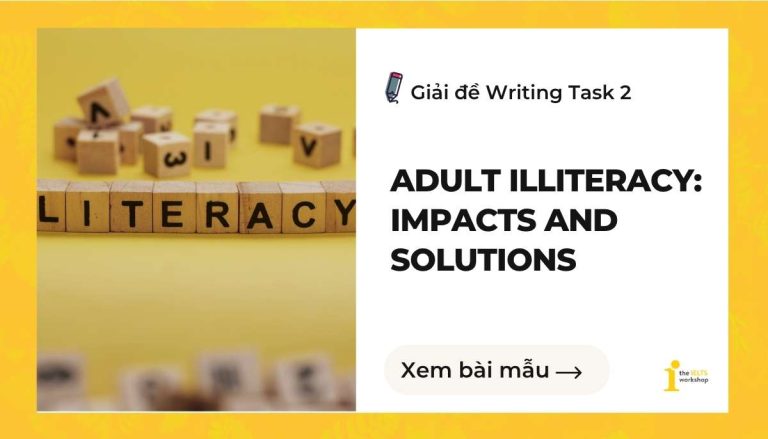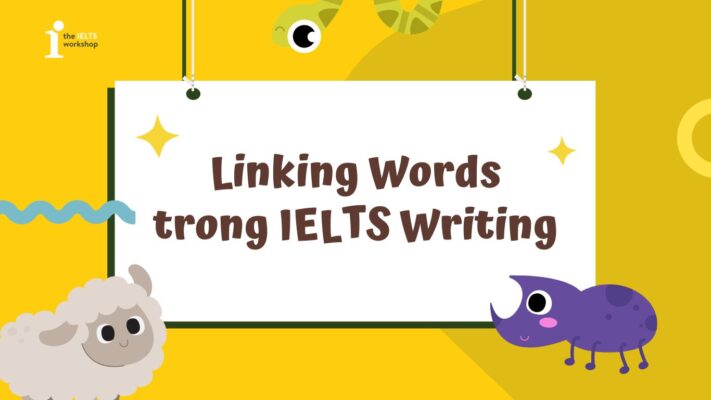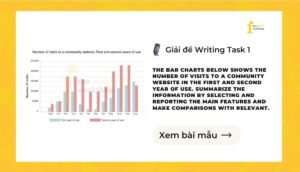Trong chuyên mục Writing Task 2 tuần này, thầy Đỗ Quang Thành từ The IELTS Workshop sẽ cùng bạn phân tích đề bài Adult Illiteracy: Impacts and Solutions – một chủ đề xã hội yêu cầu người viết đánh giá tác động của nạn mù chữ ở người trưởng thành và đề xuất giải pháp phù hợp từ phía chính phủ và cộng đồng.
1. Phân tích
1.1. Đề bài Adult illiteracy: Impacts and Solutions trong IELTS Writing Task 2
Despite better access to education, many adults today still can not read or write. In what ways are they disadvantaged? What can governments do to help them?
(Dù cơ hội tiếp cận giáo dục ngày nay đã được cải thiện đáng kể, nhiều người trưởng thành vẫn không biết đọc hoặc viết. Thực trạng này khiến họ gặp phải những bất lợi gì? Chính phủ có thể làm gì để hỗ trợ họ?)
1.2. Phân tích đề bài
- Dạng bài: cause-solution
- Từ khóa chính: better education, illiteracy, disadvantaged, solutions
Xem thêm: Hướng dẫn A-Z cách cách viết Problem and Solution Essay trong IELTS Writing Task 2
1.3. Dàn bài chi tiết
Introduction
- Paraphrase lại đề: Despite better access to education, many adults today still can not read or write. In what ways are they disadvantaged? What can governments do to help them?
- Luận điểm chính: Việc mù chữ không chỉ ảnh hưởng nghiêm trọng đến khả năng nghề nghiệp của một người mà còn cản trở sự phát triển toàn diện của thế hệ sau. Tuy vậy, chính phủ và cộng đồng vẫn có thể áp dụng nhiều biện pháp thiết thực để hỗ trợ nhóm người này.
Body Paragraph 1 – Disadvantages of illiteracy
Luận điểm chính: Người trưởng thành không biết chữ sẽ chịu nhiều thiệt thòi trong cuộc sống cá nhân và công việc.
Ví dụ: Cha mẹ thất nghiệp hoặc không hiểu thị trường lao động sẽ khó định hướng nghề cho con, khiến thế hệ sau tiếp tục thiệt thòi.
Ý 1: Cơ hội việc làm hạn chế
- Giải thích: Phần lớn các công việc ngày nay – kể cả việc làm phổ thông – đều đòi hỏi kỹ năng đọc viết cơ bản.
- Hệ quả: Những người mù chữ khó ứng tuyển, dẫn đến phải làm việc tay chân nặng nhọc, thu nhập thấp, thậm chí có thể tìm đến con đường phi pháp để mưu sinh → kẹt trong vòng luẩn quẩn của đói nghèo và thiệt thòi xã hội.
Ý 2: Ảnh hưởng đến thế hệ sau
- Giải thích: Trẻ em tiếp nhận kiến thức đầu đời chủ yếu từ cha mẹ. Nếu cha mẹ không biết chữ, việc hỗ trợ con học tập và định hướng tương lai sẽ rất hạn chế.
- Hệ quả: Trẻ dễ trở thành người học kém, thiếu hiểu biết xã hội, và gặp khó khăn khi chọn nghề nghiệp phù hợp.
Body Paragraph 2 – Government and community support
Luận điểm chính: Chính phủ và cộng đồng có thể thực hiện nhiều giải pháp thực tế để hỗ trợ người trưởng thành mù chữ.
Tác động: Giúp họ có việc làm ổn định, cảm thấy mình có ích và được cộng đồng ghi nhận.
Ý 1: Tạo cơ hội việc làm phù hợp
- Giải pháp: Chính phủ nên khuyến khích phát triển các ngành nghề không đòi hỏi kỹ năng đọc viết như xây dựng, vệ sinh công cộng, làm vườn…
- Tác động: Giúp người lao động mù chữ có cơ hội kiếm sống chính đáng và tái hòa nhập xã hội.
Ý 2: Hỗ trợ giáo dục cho con em người mù chữ
- Giải pháp: Miễn/giảm học phí, hỗ trợ chi phí sách vở, phương tiện đi lại cho học sinh có cha mẹ không biết chữ.
- Tác động: Khuyến khích trẻ đến trường, phá vỡ vòng lặp mù chữ giữa các thế hệ.
Ý 3: Tận dụng nguồn lực cộng đồng
- Giải pháp: Các tổ chức, địa phương có thể tạo việc làm đơn giản cho người mù chữ như dọn vệ sinh khu phố, làm vườn, trang trí lễ hội…
Conclusion
- Khẳng định lại quan điểm: Chính phủ và cộng đồng nên phối hợp triển khai các giải pháp từ việc làm đến giáo dục để từng bước giải quyết bài toán mù chữ trong xã hội hiện đại.
- Tóm tắt: Người trưởng thành không biết chữ phải đối mặt với nhiều rào cản trong cuộc sống và ảnh hưởng trực tiếp đến thế hệ sau.
2. Bài mẫu (Sample)
Despite significant advancements in global educational accessibility, a notable proportion of adults worldwide continue to struggle with basic literacy skills. This essay will explore the profound disadvantages faced by individuals who cannot read or write, particularly concerning their professional prospects and the intellectual development of their offspring. Furthermore, it will delineate several actionable strategies that governments and local communities can implement to mitigate this pervasive issue.
The inability to read and write presents considerable hurdles in an individual’s life, primarily manifesting as limited employment opportunities. In today’s increasingly interconnected world, even many entry-level positions, such as those for restaurant staff or delivery personnel, necessitate fundamental literacy skills for tasks like understanding orders or navigating routes. Consequently, illiterate individuals often find themselves unable to secure even low-paying jobs, which can lead to severe financial hardship. This predicament may, in extreme cases, compel them to resort to illicit means of income generation, ultimately trapping them in a cycle of poverty and social marginalization. Beyond economic disadvantages, illiteracy also impedes the cultivation of a well-informed future generation. Children raised by illiterate parents may lack the broad understanding of the world that is often imparted through parental guidance and exposure to diverse knowledge sources like books. Without the ability to explore cultures, natural phenomena, and global events through written materials, these parents may struggle to transmit such vital understanding to their children. As a result, these children are at a higher risk of remaining illiterate or being poorly informed about the world, thereby facing significant challenges in navigating their own lives. For instance, without proper guidance from potentially underemployed parents who cannot adequately predict future job market trends, these children may find it difficult to make informed decisions about their own career paths.
Fortunately, there are tangible steps that both governments and communities can undertake to address the plight of illiterate adults. Governments can play a crucial role by actively creating and promoting job opportunities that do not demand advanced literacy skills. Professions such as builders, janitors, and city landscapers are prime examples of roles that can be filled by individuals who struggle with reading and writing. By making these jobs more accessible, governments can encourage illiterate adults to re-enter the workforce, potentially resulting in a sense of dignity and economic participation. Concurrently, local authorities should prioritize subsidizing and supporting the education of children from illiterate households. This can involve a range of measures, including covering tuition fees, offering discounts on essential school supplies like books and stationery, and providing assistance with transportation costs. Such initiatives are crucial in encouraging these children to attend school regularly and complete their education, thereby breaking the intergenerational cycle of illiteracy. Finally, communities themselves can contribute significantly by identifying and utilizing the skills of illiterate individuals for neighborhood-based tasks. Simple community favors, such as gardening, local landscaping projects, or street clean-ups, can provide opportunities for employment and social integration, benefiting both the individuals and the community as a whole.
In conclusion, while the inability to read and write undeniably hampers an individual’s career progression and can negatively impact their children’s intellectual development, concerted efforts from governments and communities can offer viable solutions. By focusing on creating suitable employment and providing educational support for the next generation, societies can empower illiterate adults and pave the way for a more inclusive and knowledgeable future.
Sample by Do Quang Thanh – IELTS Teacher at The IELTS Workshop
3. Từ vựng (Vocabulary)
- a notable proportion: một tỷ lệ đáng kể
- struggle with basic literacy skills: gặp khó khăn với các kỹ năng đọc viết cơ bản
- profound disadvantages: những bất lợi sâu sắc
- professional prospects: triển vọng nghề nghiệp
- delineate several actionable strategies: vạch ra một số chiến lược có thể thực hiện được
- mitigate this pervasive issue: giảm thiểu vấn đề phổ biến này
- presents considerable hurdles: gây ra những trở ngại đáng kể
- primarily manifesting as: chủ yếu biểu hiện ra dưới dạng
- necessitate: đòi hỏi
- secure even low-paying jobs: kiếm được ngay cả những công việc lương thấp
- compel: buộc
- resort to: dùng đến như một giải pháp cuối
- illicit means of income generation: các phương thức kiếm tiền bất hợp pháp
- a cycle of poverty and social marginalization: vòng luẩn quẩn của nghèo đói và bị gạt ra ngoài lề xã hội
- being poorly informed: thiếu thông tin
- navigating their own lives: việc định hướng cuộc sống của chính họ
- make informed decisions about: đưa ra quyết định sáng suốt về
- tangible steps: các bước cụ thể
- prime examples of roles: những ví dụ điển hình về các vai trò
- concurrently: đồng thời
- social integration: hòa nhập xã hội
- undeniably hampers: chắc chắn cản trở
- concerted efforts: những nỗ lực phối hợp
Xem thêm: Tổng hợp cách paraphrase Writing Task 1
Tạm kết
Chủ đề Adult Illiteracy: Impacts and Solutions không chỉ nhấn mạnh những hệ lụy nghiêm trọng của tình trạng mù chữ đối với cá nhân và thế hệ sau, mà còn mở ra hướng tiếp cận giàu tính thực tiễn về vai trò của chính phủ và cộng đồng trong việc giải quyết vấn đề này.
Đừng quên luyện tập thêm với [Cập nhật liên tục] Tổng hợp đề thi IELTS Writing 2025 kèm bài mẫu và Bài mẫu Writing Task 1 để hiểu cách xử lý các dạng biểu đồ thường gặp trong bài thi.
Học IELTS ngay tại HỌC IELTS MIỄN PHÍ cùng The IELTS Workshop nhé !









